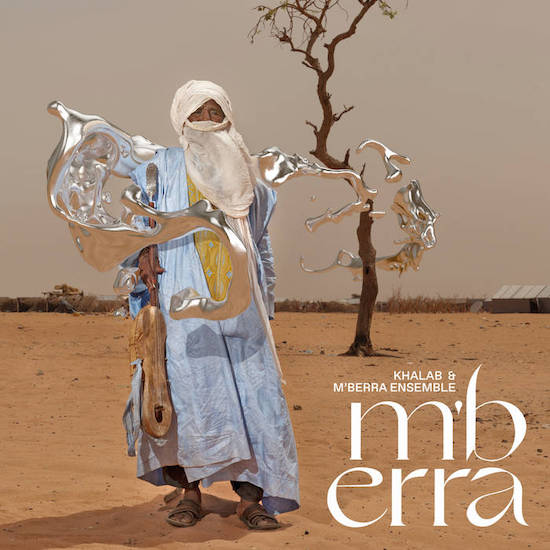M’berra has existed since the early 1990s, when people fled violence in neighbouring northern Mali. Its population has fluctuated with relative periods of peace and war in the region, but recently there have been as many as 60,000 people living in the desert settlement. Khalab visited M’berra in 2017 to meet its people, record its sounds and, it turns out, to create a fourteen-strong ensemble of Tuareg and Hassaniyya musicians, playing their own music in their own styles together. Among the musicians are members of groups such as Tartit, Tafalawist, and Imarhan Timbuktu. From the population of a refugee camp, a supergroup.
The Tuareg music that makes it into ears outside of the Sahara is often that of tishoumaren, the loping, bluesy, guitar-based music that was pioneered by Tinariwen and skyrocketed to the über-cool with artists such as Imarhan, Mdou Moctar, and Bombino. It would be easy for Khalab to focus on the guitar styles, but instead, he gravitates towards the deeper roots. On this album, the sounds of M’berra are the acoustic strains of the banjo-like tehardent lute, the one-stringed imzad fiddle and the tinde drum. The tishoumaren guitar still has its place, but as an equal in the music’s pantheon rather than acting as its overarching definition.
These iconic sounds of the Tuareg are mixed with the voices of the musicians and the everyday hubbub of M’berra. Back in Italy, Khalab crafts loops and atmospheres from the original recordings, chopping and changing and layering them with waves of synths, deep basses and mangled effects. The Tuareg melodies find a home among this shifting digital desert, floating like fresh breeze above the darker tone set by the electronics. The album reaches its peaks where the instrumentation and production flow together as one: on the track ‘Curfew’, where the pulsing synth bass creates polyrhythms with the tehardent, or on ‘Moulin Shakur’, where the lute is glitched-out and overdistorted, hitting the ears somewhat like a West African Konono No. 1.
Back in the Real World, the question to be asked of all intercultural collaborations is: does the fusion of styles add or subtract? Would the album be better if the collaboration had been kept to a minimum? Is the collaboration organic or manufactured – is it ‘real’? In M’berra’s case, it’s not so clear. The album’s final track, ‘Skit Guit’ is the domain of a single electric guitarist, whose sparse melody cuts deep to the soul, uninhibited by heavy production. It’s arguably the most affecting track of the lot. Together, Khalab and the M’berra Ensemble create fantastical shapes that tell stories of the refugee camp through a digitally-inverted lens, but what I really want to hear is that Tuareg supergroup in full voice, front-and-centre and leading the way – displaced but not silenced, roaring.


